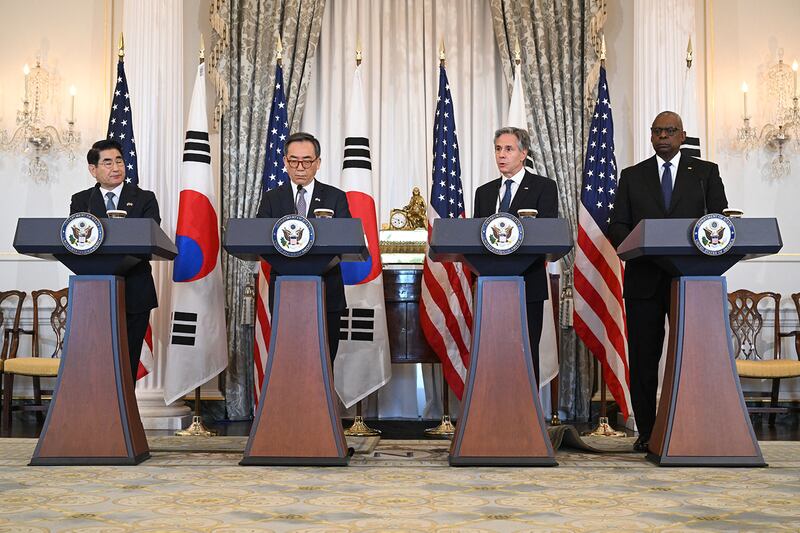WASHINGTON – Some 8,000 North Korean troops dressed in Russian military uniforms are expected to be deployed into combat against Ukrainian forces “in the coming days,” U.S. Secretary of State Antony Blinken and Secretary of Defense Lloyd Austin said on Thursday.
Speaking alongside their South Korean counterparts after a joint meeting at the State Department, the two U.S. officials said that the deployment of the North Korean troops into the war, or any supporting role, would make them “legitimate targets” for Ukraine.
“We now assess that there are some 10,000 North Korean soldiers in total in Russia, and the most recent information indicates that as many as 8,000 of those North Korean forces have been deployed to the Kursk region,” Blinken said, adding they had not yet joined combat.
“We would expect that to happen in the coming days,” he said.
RELATED STORIES
North Korea hunting for source of reports on soldier deployment to Ukraine conflict
Is China peeved – or pleased – by North Korean troops in Ukraine?
Kim Jong Un’s close aide in Russia overseeing North Korean troops: report
Russia pays North Korean soldiers about $2,000 a month: South’s spy agency
US urges China to use influence amid ‘destabilizing’ action by North Korea, Russia
Ukrainian forces launched a counter-invasion of the Russian border region of Kursk three months ago in order to disrupt Moscow’s supply lines to within Ukraine and to divert its forces from battle there.
Russia’s ambassador to the U.N. Security Council on Thursday declined to answer a question from his U.S. counterpart about whether Moscow still denied the presence of North Korean troops on Russian soil, remaining silent when prodded by the American diplomat.
North Korea had initially denied having sent troops to Russia but has since switched to defending any deployment as being in line with international law. Still, authorities in North Korea have dismissed the reports as “rumors” in public announcements.

Russian uniforms
At the State Department press conference, Austin, the U.S. defense secretary, told reporters that Russian forces in Kursk had been busy training the North Korean troops in the use of artillery, drones and “basic infantry operations, including trench clearing.”
“The Kremlin has also provided these DPRK troops with Russian uniforms and equipment, and all of that strongly indicates that Russia intends to use these foreign forces in front line operations,” Austin said, using an acronym for the North Korean government.
The defense secretary also renewed calls for Beijing to intervene to stop its allies North Korea and Russia from escalating the conflict in Ukraine, noting the Chinese government’s calls for peace there.
“If China is serious about its desire for de-escalation, it should be asking Russia some hard questions at this point, about whether it intends to broaden this conflict by this kind of behavior,” he said.
But Austin also nodded to the emerging coalition of anti-U.S. forces referred to by some commentators as a new “axis,” saying that the U.S. and South Korean officials had in their meeting discussed the growing connections between geopolitical security in Europe and Asia.
“We’re also closely tracking other bullying by the DPRK, Russia and the People’s Republic of China,” he said, vowing to oppose “coercive destabilizing actions in both the Indo-Pacific and the Euro-Atlantic.”
South Korean Defense Minister Kim Yong-hyun told the press conference Seoul denounced the North’s “illegal military cooperation with Russia” and wanted an “immediate withdrawal” of the troops.
